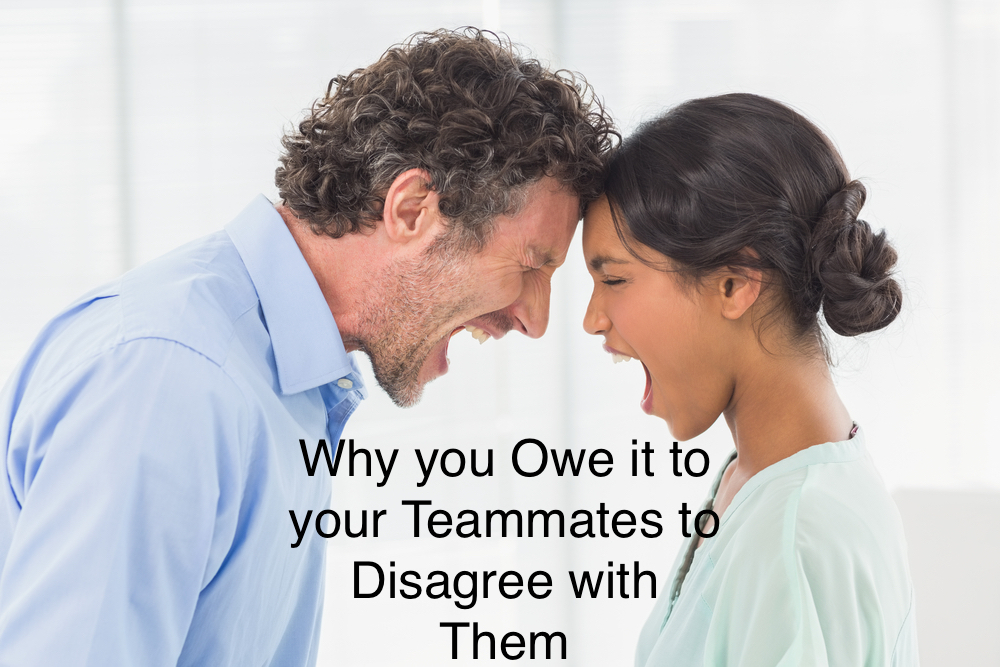I am becoming increasingly convinced that the ability to have conflict effectively is the holy grail of team effectiveness. I spend day after day helping team members understand the benefits of conflict, defining the nature of conflict required, and building the skills to have conflict effectively. Some get it. Others stare back at me hoping that I will let them off the hook. I won’t, and I can’t. And you can’t let yourself off the hook either.
You have an obligation to have conflict with your teammates.
- If everyone on your team thinks alike, you are missing something. You are missing opportunities and ignoring risks.
- Your role needs to complement the roles of your teammates. Your role is probably built to be in tension with other roles on your team. If you fail to advocate for your position, the system gets out of balance.
- Only when you present a compelling defense of your position can your teammates have the confidence to pull hard in the other direction. That tension is necessary.
I know you don’t like having conflict. You don’t even like when I use that word. I don’t like conflict either. You need to do it anyway. I need to do it too. Here are some outdated assumptions about conflict that we have to get over.
- Having conflict means I don’t share the same goals as my team and I’m not a good team player. Nope, not true. You can have exactly the same goal and have different ideas about how to achieve it, different perceptions of the status quo, different interpretations of progress, etc. One way to make conflict feel better is to start by stating the shared goal before you disagree. “We both want to put the best product on the market. You think we have done all we can do. I think there’s room to improve.”
- Having conflict with a teammate means I’m throwing them under the bus. Really? Throwing someone under the bus is sideswiping them, agreeing in private and then disagreeing in public, or about blaming them for something they didn’t do. As long as you have conflict with integrity, no one will end up under a bus. “I see why you’re advocating to wait another month for launch. I’m just going to argue for a moment about the benefits of launching now.”
- Having conflict will erode trust between my teammate and I. That’s true if we’re talking about personal, vindictive conflict, but not true at all when we’re talking about being transparent about what’s concerning you. Knowing that a teammate will be honest with you when they disagree contributes to real trust—the kind you can count on. “Can I give you some feedback about your presentation? You only presented the data from the past 3 months. It made me nervous that you’re not telling the whole story.”
- Having conflict will slow us down. It seems like conflict is slow, but what’s really slow is letting issues fester or letting resistance stay under the radar. Covert resistance leads to decisions being reopened or implementation being stalled. Now THAT’S slow. Instead, get the issues on the table so you can move forward. “I think there are three issues we need to resolve before we can come to a decision.”
- Having conflict isn’t worth it because it won’t change anything. Cynicism is such an insidious thing. By convincing yourself that nothing will ever change, you fall down on your obligation to disagree openly and by failing to disagree openly, you ensure that nothing will ever change. If you’ve reached the point of thinking you can’t make anything better, it’s time to get out. “I’ve said this before. We need a more detailed plan for how we proceed. How do we make sure it’s different this time?”
If you’re a great team player, you will internalize and live up to your obligation to disagree with your teammates. Don’t pretend that conflict is optional—it’s not. You owe it to your teammates to disagree with them.

This article goes well with one on how to receive input that doesn’t match your world view. “Tell me more…”